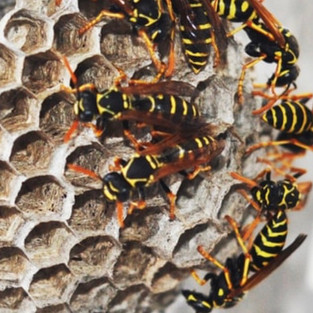Eliminating Wasp Nests
- Farm 2 Markt

- Oct 7, 2019
- 2 min read
Because all wasps are useful to us as insect predators, experts suggest leaving their nests alone unless they pose an imminent threat to human or animal health.
Mark the area, and stay away from it until the wasps all leave in late fall. They won’t return to the nest next year.
But when yellow jackets have stung or built their nest near the home or outbuildings, or in the path of human activities, you may want to eliminate it.
Here’s what to do:
If it’s a very large nest, or if you’ve ever had a severe reaction to wasp or other insect stings, hire a licensed exterminator to handle the job.
If you decide to do it yourself, identify that the stinging insect is indeed a yellow jacket or other aggressive wasp. Mark the location of the nest, without getting too close.Buy a pressurized can of wasp and hornet jet spray that sprays a solid stream of insecticide spray that will reach 10 feet or more.
Treat at night when most workers will be in the nest, and inactive. Use a flashlight with a red filter over the bulb. Wasps can’t see red light well. At least two hours after dark, quietly and carefully approach the colony and thoroughly spray into the entrance.
Don’t give a quick shot; spray for several seconds to make sure the spray penetrates deep into the nest. After spraying, walk away immediately and stay away for a full day.
For ground colonies, carry a shovel full of soil with you to cover the entrance before you walk away. Coveralls can be helpful, especially if they are slick, smooth material worn over other thick clothing.
If wearing a shirt and pants, securely tape or tuck them together at the waist. Wear boots. Wasps may crawl over shoes and sting your ankles. Seal the pant cuffs securely over the boots with tape or rubber bands. Protect hands with leather or heavy rubber gloves, securely sealing the arms to the gloves at the cuffs.
A beekeeper’s hat and veil will keep wasps away from your face and neck. Make sure to fasten it to the clothing around your neck and shoulders.
Hope these are very helpful, Happy gardening. Yours in the garden Farm2Markt.






Comments